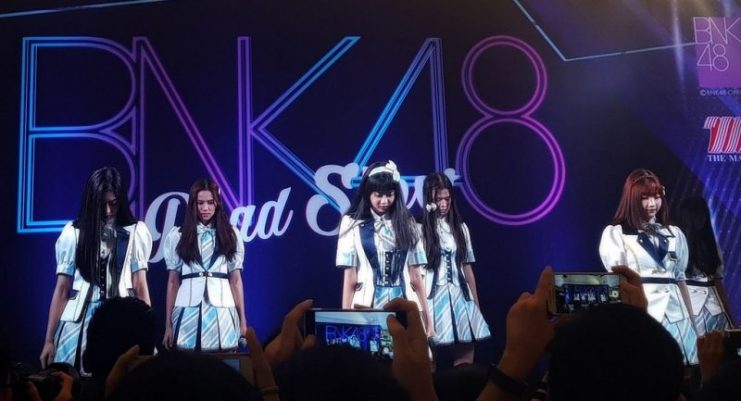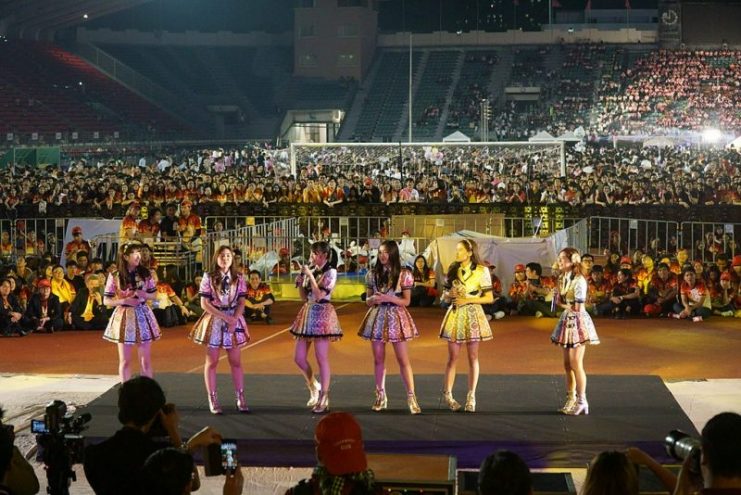In recent weeks, it has been reported that there has been a rise in young people around the world who have had little or no education regarding the Holocaust. Up to 22% of American “millennials” who responded to a survey could not recall what the Holocaust was, and two-thirds claimed not to have heard of Auschwitz.
With statistics like this, it should not have come as much of a shock to discover that the youth of Thailand would also struggle to identify this historical event.
The point was highlighted on stage at the end of January 2019 when a member of the Thai girl band “BNK 48” was seen wearing a Nazi flag top during a televised rehearsal show. The singer, Pichayapa “Namsai” Natha, made a tearful apology on stage to fans the following Saturday night when she said, “I want this to be an example for everyone, please forgive me.”

Namsai then went on Instagram where she announced full responsibility for the costume drama and said it was all my mistake. She appealed to fans to help her not to make similar mistakes in the future.
The Deputy Chief of Mission at the Israeli Embassy in Bangkok expressed “shock and dismay” on Twitter on Saturday. She was doubly horrified that Sunday was also International Holocaust Remembrance Day.
Smadar Shapira said, “Presenting Nazi symbols by the band’s singer hurt the feelings of millions around the world.”
On Sunday the manager of the band, Nataphol Pavaravadhana, went with Namsai to meet the Israeli ambassador to Thailand. Following this meeting, it was confirmed that all 51 members of the “team-idol” band will attend an educational workshop on the Holocaust.

On Facebook, BNK 48 apologized for any distress caused and said it would work hard to ensure nothing like this would happen again.
Fans were supportive, with many pointing out that the Thai education system focusses on more regional wars between Thailand and Myanmar and the colonial wars waged by the Japanese Empire. Events in Europe during WWII are given much less classroom time.
Band fan Prasit Rudeekriengkrai said, “I am over forty and I don’t know anything about this topic. When I saw the shirt, I didn’t think it would be a problem.”

There are many incidences of images of Hitler, swastikas and Nazi regalia to be found on T-shirts and other memorabilia in Thailand. Commentators point out that this is due to a lack of historical understanding rather than support for Nazi ideology.
BNK 48 is described as “Bubblegum Pop” having grown out of the new wave of J-Pop (from Japan) and K-Pop (from South Korea). It is seen as a safe musical space for young teenagers, while their fan-base includes all age ranges. Members are selected from a team of “trainees” and are rotated through time in and out of the spotlight.

The group has had the same team-leader, or Captain, Cherprang Areekul, since the band’s creation in 2017, following auditions in 2016. It is now the third sister group of Japan’s all-girl band AKB 48, Indonesia’s JKT 48, and China’s SNH 48.
On the band’s official website, there are social media feeds listing all of the carefully curated members, including details of their birthdate, height, birth region, and, curiously, their blood group.
They have won many awards for their music, videos, and social media presence. This most recent piece of publicity has seen their profile rise beyond their home territory, but probably not in the right places.
However, it has served to shine a light on the concern that Holocaust history is fading among the young amid fears that whatever we end up forgetting we are doomed to repeat.
